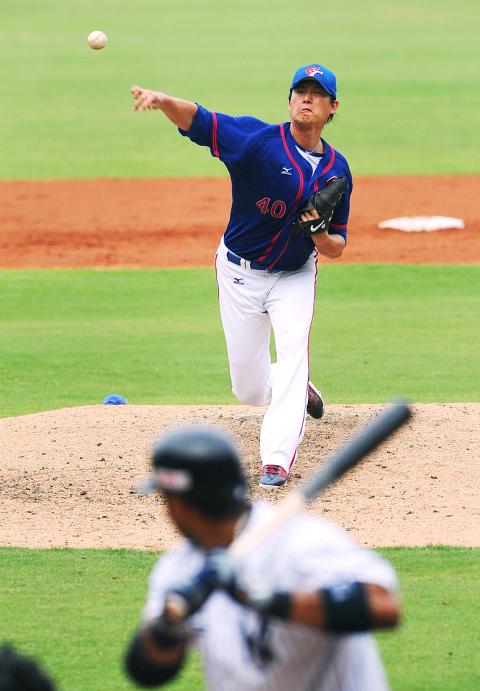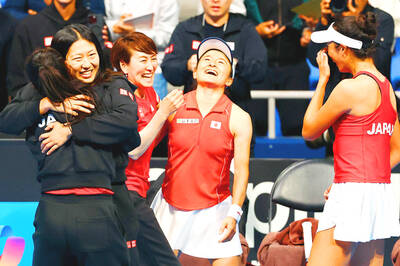An exhibition tour of Taiwan by a team of Major League Baseball All-Stars has shown the nation what its favorite sport could be like — if only it could shake off organized crime, violence and corruption.
Despite Taiwan’s ardent love for the game, the CPBL has been struggling, in large measure because of the influence of the underworld and its intimidation, gambling and game-fixing.
According to experts, the MLB All-Star Series, which the visitors wrapped up 5-0 on Sunday having drawn tens of thousands of fans, highlighted the huge gap between US baseball and the management of the sport in Taiwan.

Photo: AFP/Bros Sports Marketing
“I don’t understand the point of this MLB tour,” said Andrew Morris, a Taiwan expert at California Polytechnic State University, who has written a book about Taiwanese baseball. “It’s not going to make the locals more interested in the domestic product. It will just show the divide between the two games, and remind fans how seedy and violent Taiwan baseball is.”
Since professional baseball began in Taiwan in 1990, there have been five game-fixing scandals, four of them in the past seven years.
With each one seemingly more lurid than the last, attendances have plummeted from an average 7,000 fans a game in the late 1990s to a few thousand today.
Accounts of the scandals read like the plot of a Hollywood gangster movie. For players who were resistant to being bought off with money, cars, drugs or prostitutes, things got very ugly, very fast.
Mobsters kidnapped, beat, pistol-whipped and stabbed players and managers. Guns were inserted in players’ mouths, bullets sent to their homes as warnings, and rumors abound about players being thrown off balconies and going missing after speaking with investigators.
In 1997, the entire China Eagles team was found to be on the take and in 2008, a notorious mob boss, known as “The Windshield Wiper,” bought a franchise with the sole intention of throwing games for profit, but the local passion for the game has not been lost, Morris said.
“It was the only thing that Taiwan did better than China, but when Taiwan lost to them in the 2008 Olympics, it hurt a lot,” he said.
The US roots of baseball — introduced by the Japanese in 1906 when they ran Taiwan as a colony — can serve to highlight the nation’s differences from its giant neighbor and rival, China.
“The game is still important for the Taiwanese sense of self-identity,” Morris added, saying Taiwan “needs something to shake its political and economic malaise.”
President Ma Ying-jeou agrees.
After the latest scandal in 2009, when 40 players were indicted and a prominent politician from the southern city of Tainan was found to be running his own gambling syndicate, Ma ordered a four-year plan to prop up the league and rebuild the sport from the ground up.
The program funds grassroots and junior development through high schools and bolsters security, oversight and due diligence in the CPBL.
While it is early days, there are signs that the scheme is gaining traction. Attendance in the four-team league — down from 11 teams in two leagues in the mid-90s — grew by 20 percent this year.
“We understand that they have gone through some challenges and they are trying to wrap their arms around the problems, but baseball still has strong support in Taiwan,” says Paul Archey, vice president of MLB International. “Hopefully, us coming over here will provide a shot in the arm to the game and get people back to the stadiums.”
However, it is the game’s very popularity that has some concerned that as soon as the fans return, the gangsters will follow.
“The Taiwanese love baseball so much because of our political situation and our success in international tournaments like the Little League World Championships, but if there was another scandal, it would be unthinkable,” CPBL International Affairs director Richard Wang said. “Not just for pro-ball, but for baseball in Taiwan — full stop.”

College basketballer Kaitlyn Chen has become the first female player of Taiwanese descent to be drafted by a WNBA team, after the Golden State Valkyries selected her in the third and final round of the league’s draft on Monday. Chen, a point guard who played her first three seasons in college for Princeton University, transferred to the University of Connecticut (UConn) for her final season, which culminated in a national championship earlier this month. While at Princeton, Chen was named the Ivy League tournament’s most outstanding player three times from 2022 to last year. Prior to the draft, ESPN described Chen as

College basketballer Kaitlyn Chen (陳凱玲) has become the first player of Taiwanese descent to be drafted by a WNBA team, after being selected by the Golden State Valkyries in the third and final round of the league's draft yesterday. Chen, a point guard who played her first three seasons in college for Princeton University, transferred to the University of Connecticut (UConn) for her final season, which culminated in a national championship on April 6. While at Princeton, Chen was named the Ivy League tournament's most outstanding player three times from 2022 to last year. Prior to the draft, ESPN described Chen as a

Japan yesterday secured a second consecutive Billie Jean King Cup finals appearance with a 2-1 win over 2023 champions Canada, thanks to Ena Shibahara and Shuko Aoyama’s 6-3, 5-7, 6-2 win over Kayla Cross and Rebecca Marino in the qualifying doubles decider. Shibahara and Aoyama powered through the opening set 6-3, breaking twice for a quick 3-0 lead. Cross and Marino hit back in the second, edging it 7-5 to level the match, before the Japanese pair regained control in the third. Canada’s 18-year-old Victoria Mboko edged Shibahara 6-4, 6-7 (8/10), 7-5 in a marathon opening clash. Mboko fired eight aces to

DAY OF BLOWOUTS: Elsewhere, the Lakers clinched the third seed in the Western Conference with a 140-109 pounding of the under-strength Houston Rockets The Denver Nuggets on Friday improved their playoff position, with a triple double from Nikola Jokic helping them to a 117-109 win over the Memphis Grizzlies. The Serbian put up 26 points, 13 assists and 16 rebounds. The triple-double performance, his 34th this season, ensured that he will finish the regular season as just the third NBA player to average a triple double across an entire season. The win meant the Nuggets improved to 49-32 on the season and gave them a real chance of grabbing fourth place and home-court advantage in the playoffs. Aaron Gordon top scored with 33 points for Denver,